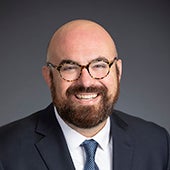Higher Education Leadership and Policy
Department of Educational Leadership and Policy
The Program in Higher Education Leadership and Policy (PHELP) is devoted to the scholarly study of higher education, its students and institutions, and its place in society. This program prepares, trains, and educates students to become researchers in academia and the private sector.
Our faculty and students are in the vanguard of understanding and shaping the dynamic environment of higher education now and in the future. Higher education is being reconceived and reorganized through: increased access and challenges in retention and completion for more diverse student communities, intensified accountability and governmental oversight, the need for lifelong avenues of learning and re-training, and the opportunities presented by digital innovations both in and out of the classroom.
Students seeking a Ph.D. receive a thorough grounding in the functioning of postsecondary institutions and in the skills of administration, decision-making, and leadership. They develop an understanding of the particular role of postsecondary institutions in society as both distributors and creators of knowledge, the historical context from which those institutions have emerged, and the ethical considerations that must surround and guide the enterprise.
Finally, the program prepares doctoral students to be consumers and producers of postsecondary research and scholarship, while socializing students towards possible careers in academia and higher education leadership. This degree emphasizes preparation for a research career in which the graduate will add to the core of knowledge that is the basis for informed practice. The curriculum is oriented toward the development of theory and research skills in a variety of methodologies and includes a strong secondary emphasis in a cognate field of study.
This program starts in the fall semester.
Upcoming Information Sessions
Application Requirements
All graduate students are required to apply through the Graduate School website. We strongly encourage you to start this process well in advance of the deadline to allow us time to process your information.
The GRE is no longer required for those applying for admission to the PHEL Ph.D. program. If applicants choose to submit GRE scores, they will not be reviewed or considered by the admissions committee.
Requirements:
- A master’s degree from an accredited U.S. institution, or proof of equivalent training at a foreign institution in education, the social sciences, or related field.
- A statement of purpose that describes:
- why you are interested in a doctoral degree in the Program in Higher Education Leadership and Policy (PHELP) at UT Austin;
- what life experiences have contributed to your decision to apply to our program;
- what personal experiences, achievements, and accomplishments would compel the department to evaluate your contributions to the University’s diversity mission;
- what type of research you would be interested in conducting and which faculty member(s) you would like to work with; and
- what your career aspirations are once you complete your degree.
- Submission of a 4-6 page writing sample (e.g., master’s thesis, published article, paper prepared for a professional conference, etc.) after you receive an acknowledgment email from the Graduate School). This email will also contain your UT EID. Please upload your writing sample to the “Miscellaneous Admissions Document” section.
- Three recommendation letters
Program Requirements
Departmental Core (12 hours) – all four are required
- ELP 390G Economics of Education (ELP 390E Econ & Finance)
- ELP 390P Educational Politics & Policy
- ELP 390S Social & Cultural Contexts of Education
- ELP 290R Organizational Design & Behavior
Specialization Courses: (18 hours)
- ELP 395S Systems of Higher Education
- ELP 390C Pro-Seminar: Research in Higher Education
- ELP 395C Adv. Issues in Higher Education (Capstone)
- Choose at least ONE:
- ELP 395L Higher Education Law
- ELP 395H History of Higher Education
- PHEL Elective Course #1
- PHEL Elective Course #2
Research and Inquiry (methods): (12 hours)
- ELP 391E Epistemologies Systems of Human Inquiry
- ELP 391P Quantitative Research Design & Analysis
- ELP 391Q Qualitative Research Design
- Advanced Course in Research Methodology OR a course in Program Evaluation
Cognate Courses outside the College of Education
(15 hours, 9 of these should be of the same cognate theme)
Research Apprenticeship (3-6 hours)
- ELP 393R Research Apprenticeship (directed studies)
Dissertation
- ELP 399R (can be taken for 3, 6, or 9 hours per semester)
- ELP 399W (can be taken for 3, 6, or 9 hours per semester)
After successfully completing at least 30 semester credit hours of required and elective coursework, students will prepare for advancement to candidacy.
Learn more about doctoral program milestones on the department’s wiki.
Core Faculty

Higher education policy, politics, and finance with a focus on serving historically underserved groups
Accepting new students

Expertise on the intersection of law and educational policies and practices focused on access and equity in higher education, including affirmative action, freedom of expression and inclusion, and the use and influence of research in law.
Accepting new students

Focuses on student governance and involvement in the areas of college student government, the student body presidency, sorority/fraternity life, equity and justice issues, queer students and issues in higher education, and educational crises and emer...
Accepting new students

Bringing the experience of 28 years as dean of the College of Education, Justiz shares his expertise in topics of public policy, the politics of education, and Latin American programs in education.

Interests include academic administration, faculty in higher education, and college student development with research on college teaching and minorities in higher education.

Focuses on identifying factors that hinder or promote the success of children and families from vulnerable and underserved populations.


Examines the experiences of faculty of color at predominantly White institutions; mentoring relationships between faculty and Black students; and work-life balance in academia.

Leads the Project MALES (Mentoring to Achieve Latino Educational Success Initiative focused on Latino males in education; seeks to advance research-informed policy solutions that enhance educational outcomes for students in secondary and post-seconda...
Accepting new students

Studies how to ameliorate social inequities in the United States through higher education policy; focuses on college pathways at broad-access institutions, including community colleges.
Accepting new students

Intersectional identities and experiences of Black women (students, staff, and faculty) in higher education; bell hooksian theory and Black feminism; student affairs programming; critical qualitative methodologies; student success and studying abroad...
Accepting new students
Affiliated Faculty

Manages and coordinates multiple research and evaluation grants and contracts for the Educational Research Center.

Focuses research on student success and graduation initiatives, including innovative college readiness assignments, student success programs and understanding the completion agenda.




Oversees the Center's community college relations and serves as a point of contact for state leaders, funders and national higher education organizations.

Focuses on policies, practices, and interventions that promote social mobility and reduce socioeconomic stratification in K12 and higher education.

Teaches courses that examine the intersectionality of culture, organizations, and systems of privilege, power, and difference in higher education.

Centers research on college student identity development, personal branding for student leaders, and work/life integration for student affairs administrators

Academic technology, technology-enhanced learning, learning technologies, online education, college teaching and learning, course evaluations, design thinking, design pedagogy, learning experience design, and developing expertise in generative AI too...

Focuses on university-wide campus climate initiatives such as developing inclusive classrooms, campus climate issues and support, and recruitment/retention of faculty of color at predominantly white institutions.

Program Starts: Fall
Deadline to Apply: December 1
Credit Hours Required: minimum 66 hours including dissertation
Schedule: Full time or part time permitted per discussion with program head
Program Location: On Campus
GRE Required? No

Program Co-coordinator
Lauren Schudde

Program Co-coordinator
Michael Anthony Goodman

Graduate Admissions Coordinator
Jacinda Herrera
Let us know what your academic interests are within the College of Education and we’ll be in touch.


